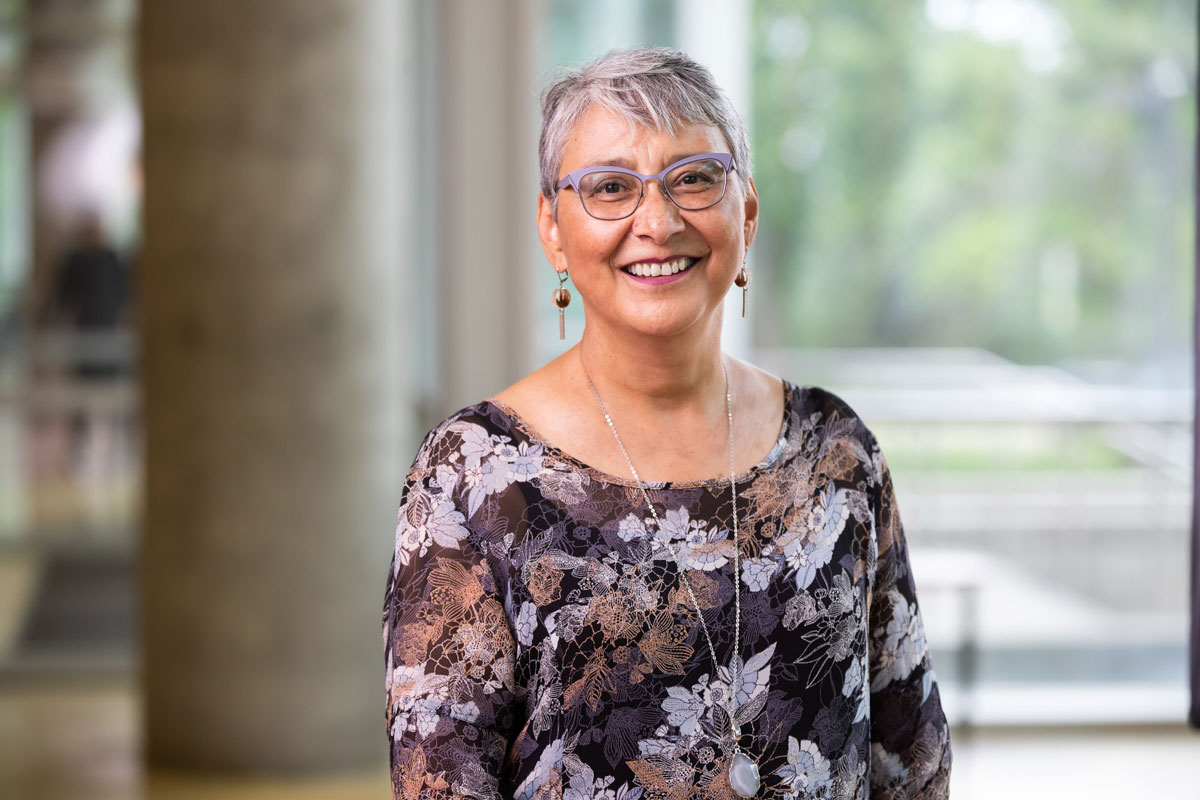
Through her poetry, Faculty of Arts Alumni Honour Award recipient Marilyn Dumont has inspired generations of Indigenous writers and scholars. PHOTO: University of Alberta
Marilyn Dumont ('91 BA, English) can remember the moment she first began to take her writing seriously.
She was listening to a friend read aloud from their journal when the realization hit her. "This is what I want to do," she thought. "I want to be able to take someone on a journey."
Dumont, who was in her 30s at the time, didn't think about being published or winning awards -- she simply wanted to move people with her words. Her journaling soon became poetry, and her poetry became a way to explore her Cree/Métis ancestry and to help others navigate the complexities of Métis identity.
From this unassuming beginning, Dumont never could have imagined where her own journey would lead her or how many people she'd end up reaching. Most recently, she has been named the recipient of an Alberta Governor General's Distinguished Artist Award for 2019 and a League of Canadian Poets Lifetime Membership Award in 2018. Her four poetry collections have won numerous awards, and her works have regularly appeared in periodicals and anthologies since the early 90s.
In particular, poems from Dumont's first book, A Really Good Brown Girl, have been widely anthologized in secondary and post-secondary textbooks. The collection - which has been printed 15 times since it was first published in 1996 - is a powerful exploration of what it means to grow up Métis in Canada.
"It's beyond my dreams to have it in schools. I'm just so glad that there's something written about the Métis," says Dumont, who is a descendant of prominent 19th century Métis leader Gabriel Dumont. "Art helps educate the Canadian public, because if you look at this country people don't have an understanding of its history. It hasn't been taught in schools."
Indeed, when Dumont arrived at the U of A in the 80s to complete her undergraduate degree, she originally studied anthropology because "it was the only department that offered anything with an Indigenous title." After completing all the courses that focused on Indigenous issues, she began taking English courses to pursue her interest in literature and writing. She also had a keen interest in the history of languages, stemming directly from her own experiences.
"I was interested in how the English language had become so dominant and how the Cree language, which I grew up with, was subordinated," says Dumont, who went on to complete a MFA in Creative Writing from UBC.
It is this complicated relationship with language that Dumont says helped forge her distinct poetic voice, and influenced her approach as a teacher.
"In a way, teaching came naturally because of my own journey to learn how to write, and my own struggle with the English language," she says, explaining that she grew up in a house with Cree speakers but was only taught English.
"There was always this struggle with expressing myself in a language that's really not mine, and how do I bring that Cree or Métis sensibility out in the English language as I use it," she says. "That's one of the things I teach students - how to see language as something you can manipulate."
Dumont's teaching and mentorship has influenced many generations of young writers. She has led writing workshops, including at the Banff Centre for the Arts, completed six writer-in-residencies across the country and taught courses at several post-secondary institutions. Since 2016, Dumont has been back at her alma mater as an associate professor with UAlberta's Department of English and Film Studies and the Faculty of Native Studies.
Dumont's colleagues point out that her work has also had a profound impact outside the literary world. "I have talked to a large group of Métis scholars who have found her poetry a great source of strength and a touchstone that we have used to endure the manner in which Métis issues are normally written and talked about in a Canadian context," says Chris Andersen, Dean of the Faculty of Native Studies. "She is a tireless advocate for a more dignified way to understand Métis identity and, more importantly, the Métis people."
While Dumont never foresaw her work having this kind of reach and impact, she can understand why her writing might fill such an important role for the Métis community.
"It's a mixed up, confused identity that the Métis have been given," she reflects. "It took me 64 years to now say we deserve to be proud of who we are, and we deserve to express that openly. We don't have to apologize for who we are."